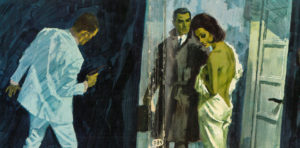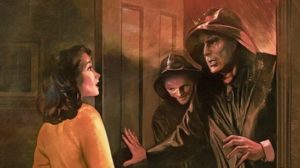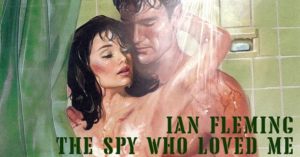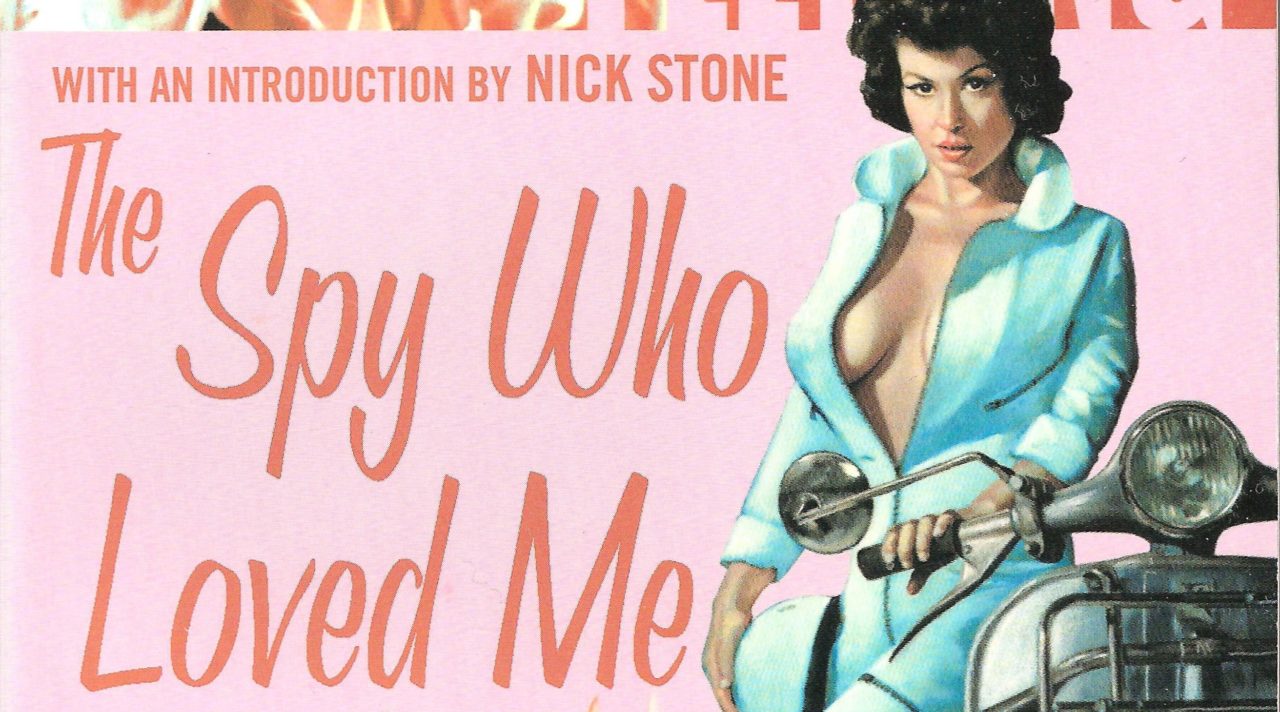Ian Fleming doesn’t want you to read The Spy Who Loved Me. He blocked a paperback edition being published during his lifetime and refused to let the plot be adapted into a film, only the title could be used. The slight novel, barely 200 pages, is a true oddity in Fleming’s canon; an experiment that went awry. The writer interrupts his SPECTRE trilogy to deliver a tale told in the first person by a young woman who has a brief but memorable encounter with James Bond one dark and stormy night. The secret agent himself doesn’t appear until 120 pages in. The purpose of The Spy Who Loved Me was supposed to be to correct the image of Bond in popular culture, to show him again as a dangerous cold man to be wary of rather than treat as a classical hero. As it concludes it becomes apparent the novel fails dramatically at its initial goal but the sheer attempt at doing something so different keeps The Spy Who Loved Me immensely readable throughout despite its baffling nature.
 The novel’s narrator is Vivienne Michel, a 23-year-old wayward, independent, and somewhat melancholic woman. She’s probably the best-realised female character in a Bond novel, as she should be considering Fleming keeps her the sole point-of-view character for all 200 pages. Fleming also uses a very different writing style, swapping his crisp, clear prose for long sentences filled with remembered tangents. “And” is truly Viv’s favourite word. The Bond of the early novels in the series would make for a good contrast of personality with Vivienne but he has grown increasingly melodramatic in recent outings, notably Thunderball, and there is surprisingly little distinction between the two at times. And despite being from Viv’s perspective, Fleming can’t drop the military similes and metaphors despite them not fitting the character, from “wild maples flamed here and there like shrapnel-bursts” to the “gun-metal surface of the lake”.
The novel’s narrator is Vivienne Michel, a 23-year-old wayward, independent, and somewhat melancholic woman. She’s probably the best-realised female character in a Bond novel, as she should be considering Fleming keeps her the sole point-of-view character for all 200 pages. Fleming also uses a very different writing style, swapping his crisp, clear prose for long sentences filled with remembered tangents. “And” is truly Viv’s favourite word. The Bond of the early novels in the series would make for a good contrast of personality with Vivienne but he has grown increasingly melodramatic in recent outings, notably Thunderball, and there is surprisingly little distinction between the two at times. And despite being from Viv’s perspective, Fleming can’t drop the military similes and metaphors despite them not fitting the character, from “wild maples flamed here and there like shrapnel-bursts” to the “gun-metal surface of the lake”.
In the early chapters Viv details her teenage years as a French Canadian who moves to England to go to finishing school before getting a job working for a newspaper. The plot is near non-existent but there are flashes of character that build Viv into a sympathetic individual, the primary aim of the first third of the novel. She falls in love with Derek but it becomes clear he’s only interested in her for sex and she reluctantly agrees to relinquish her virginity. In a very uncomfortable chapter, the two are discovered at the cinema in a compromising position and so travel to a local meadow instead. It’s a completely new dynamic on sex for Fleming, shedding any fantasy or romanticism, and committing to Viv’s embarrassment and vulnerability. It’s really quite affecting, and more graphic than previous novels. Viv doesn’t feel like a classic ‘Bond girl’ and the world has no sense of the ridiculous escapism usually found in James Bond stories. It feels real and honest, more like a kitchen sink drama.
 After Derek, Viv begins a relationship with her boss, Kurt, a German man on which Fleming unloads every stereotype he can think of. Kurt’s life is dictated by order, symmetry, and planning, even when it comes to his love making. With him Viv initially has a better sexual experience: unhurried, safe, private. Yet rather impersonal too. I wasn’t expecting Ian Fleming to write a book about consent but I was rather shocked at how not totally awful and offensive he was at writing sex from a female perspective, given his previous work. Vivienne discovers she is pregnant and Kurt’s response to finding out is, simply, “so?” The moment reminded me of the short powerful responses found in Mad Men (“Who cares?”; “You people”) that break your heart in a swift punch of brevity. She is promptly sacked and sent for an abortion. All we hear of it is “it was as mentally distressing but as physically painless as I had expected”, and I wish it had been further explored, although maybe I don’t considering that it’s Fleming doing the writing.
After Derek, Viv begins a relationship with her boss, Kurt, a German man on which Fleming unloads every stereotype he can think of. Kurt’s life is dictated by order, symmetry, and planning, even when it comes to his love making. With him Viv initially has a better sexual experience: unhurried, safe, private. Yet rather impersonal too. I wasn’t expecting Ian Fleming to write a book about consent but I was rather shocked at how not totally awful and offensive he was at writing sex from a female perspective, given his previous work. Vivienne discovers she is pregnant and Kurt’s response to finding out is, simply, “so?” The moment reminded me of the short powerful responses found in Mad Men (“Who cares?”; “You people”) that break your heart in a swift punch of brevity. She is promptly sacked and sent for an abortion. All we hear of it is “it was as mentally distressing but as physically painless as I had expected”, and I wish it had been further explored, although maybe I don’t considering that it’s Fleming doing the writing.
“I had now been let down both by the worldliness of Derek and by the homespun of Kurt.” The first half of The Spy Who Loved Me is dedicated to setting up Vivienne’s attitude towards men because of her past trauma before her story collides with Bond. It’s not the most exciting material but as set-up it is competent enough, although using so much of the page count to do so puts an awful lot of pressure on the pay-off. Viv decides to reinvent herself, or ‘find herself’ to use a more cliched term, and she takes on a more confident and self-centred persona. It’s almost like the origin story of a Bond girl, discovering what fuels her before reading about her buying a white leather outfit and travelling down the east coast of Canada and the United States on a Vespa. “I won’t go into details since this is not a travelogue”, she states before proceeding to describe in detail her journey and the places she visits in typical Fleming fashion.
 At last Vivienne arrives at the Dreamy Pines Motor Court, ten miles west of Lake George, New York State, the setting for the rest of the novel. The location has a great sense of atmosphere, from the towering trees encircling the building to the incoming storm and the solitude Viv finds herself in after agreeing to watch the Motel for the owners. Her night takes a turn for the worse when two gangsters, the completely hairless Sluggsy Morant and metal-toothed Sol Horowitz, arrive to burn the place down and collect the insurance money – a small time crime for the villains of a Bond novel; simple crooks rather than megalomaniacs. The two criminals are fine for the story they are in but are certainly some of the least memorable villains of the series, as well as playing into the American gangster tropes Fleming has already explored in previous books.
At last Vivienne arrives at the Dreamy Pines Motor Court, ten miles west of Lake George, New York State, the setting for the rest of the novel. The location has a great sense of atmosphere, from the towering trees encircling the building to the incoming storm and the solitude Viv finds herself in after agreeing to watch the Motel for the owners. Her night takes a turn for the worse when two gangsters, the completely hairless Sluggsy Morant and metal-toothed Sol Horowitz, arrive to burn the place down and collect the insurance money – a small time crime for the villains of a Bond novel; simple crooks rather than megalomaniacs. The two criminals are fine for the story they are in but are certainly some of the least memorable villains of the series, as well as playing into the American gangster tropes Fleming has already explored in previous books.
The novel may not have the same sense of adventure as other Bond stories but at least the Dreamy Pines introduces more of a movie-like quality to the story, a sense of vaguely exotic Americana. ‘Bad Times at the Casino Royale’, if you will. And while ultimately captured and threatened with sexual violence, I do like that Fleming doesn’t make Viv totally useless at this point. She fights back and cuts Sol, even briefly escaping. The whole encounter is tense and has the feel of a tangible nightmare. Wherever Viv runs she is found, she can’t get away, and Sluggsy and Sol don’t seem to feel pain. There’s a powerful sense of dread, as if Super Hans himself wrote it. In the terror, Viv finds that energisation of spirit that she had been searching for in the most unexpected of places: “Love of life is born of the awareness of death, of the dread of it.”
 Just as Viv is about to be raped, 120 pages into the 198-page novel, Bond appears, ringing the bell and entering through the door like a beloved sitcom character to thunderous applause. “What a fantastic bit of luck this man, and just this man, coming so magically out of the blue.” I couldn’t have said it better myself, Viv. You might think Bond finally entering the story would amp up the excitement but it does the opposite. Suddenly the pace and tension take a nosedive. The threat is completely dissipated instead of bubbling under the surface when the gangsters and Viv essentially tell Bond what is happening and instead of doing anything he demands food and sits down. He and Viv openly talk while Sol and Sluggsy wait at the table next to them. Viv was about to be raped and murdered and no one cares! Bond instead tells the story of what led him to the motor court, which includes stopping a SPECTRE operation, while Viv falls in love with him.
Just as Viv is about to be raped, 120 pages into the 198-page novel, Bond appears, ringing the bell and entering through the door like a beloved sitcom character to thunderous applause. “What a fantastic bit of luck this man, and just this man, coming so magically out of the blue.” I couldn’t have said it better myself, Viv. You might think Bond finally entering the story would amp up the excitement but it does the opposite. Suddenly the pace and tension take a nosedive. The threat is completely dissipated instead of bubbling under the surface when the gangsters and Viv essentially tell Bond what is happening and instead of doing anything he demands food and sits down. He and Viv openly talk while Sol and Sluggsy wait at the table next to them. Viv was about to be raped and murdered and no one cares! Bond instead tells the story of what led him to the motor court, which includes stopping a SPECTRE operation, while Viv falls in love with him.
James Bond will just not stop smiling. This section of The Spy Who Loved Me sees the character at his most charming and friendly. A comforting presence, really, for both Viv and the reader considering the circumstances. It’s not long either before he’s at the most attractive we’ve probably ever seen him, running around shirtless with nothing but a gun holster strapped to his chest. It’s classic action hero stuff, not only classic Bond. But for this book that’s a problem. Ian Fleming’s entire reasoning for writing the novel was to show a cautionary tale about Bond. About the dangers for an innocent young woman caught up in one of his adventures. In that respect, the novel is a complete failure. That is not what Fleming wrote. He stumbles into a situation Viv has already found herself in. And Fleming’s idea of showing how bad and inhuman Bond is is to have him save a woman from being raped and murdered! What kind of reasoning is that?
 When the action kicks into gear and Bond comes to Viv’s rescue, Fleming wants to commit to her point of view but also have his cake and eat it too with Bond’s. He saves Viv from the burning motel and then, in the literal heat of battle, Bond explains to her exactly what he had been doing in the ten minutes previous in a multiple-page monologue to catch the reader up and revel in the action. The action finale overall is disappointing, especially because Bond refuses to kill in cold blood, again showing how heroic and unproblematic he is in a book that needs to do the opposite. There’s a crash of guns and random shooting back and forth before the gangsters escape in their car which Bond shoots and it drives into the lake. Viv does little during the encounter, other than give a running commentary, and while she briefly shoots at the car it is made clear it is Bond who delivers the killing blow.
When the action kicks into gear and Bond comes to Viv’s rescue, Fleming wants to commit to her point of view but also have his cake and eat it too with Bond’s. He saves Viv from the burning motel and then, in the literal heat of battle, Bond explains to her exactly what he had been doing in the ten minutes previous in a multiple-page monologue to catch the reader up and revel in the action. The action finale overall is disappointing, especially because Bond refuses to kill in cold blood, again showing how heroic and unproblematic he is in a book that needs to do the opposite. There’s a crash of guns and random shooting back and forth before the gangsters escape in their car which Bond shoots and it drives into the lake. Viv does little during the encounter, other than give a running commentary, and while she briefly shoots at the car it is made clear it is Bond who delivers the killing blow.
With the villains vanquished what else is there to do but for Bond and Viv to shower and make love in the still-burning motel. With Fleming completely messing up his intended characterisation for Bond, this is now the novel’s final chance to say something, to justify its existence, through Viv, but essentially her characterisation and journey comes down to ‘a woman’s search for a good screw’. After issues with past lovers, Bond is able to give her what she’s been pining for, namely an orgasm. “He smelled of cordite and sweat. It was delicious. At last I realised what this thing could be in one’s life.” Viv’s sexual self-actualisation is a realisation that “all women love semi-rape” and Bond, the mystery man who accosts her in the shower, finally shows her the path. When I learnt Fleming was writing an entire novel from a female perspective this was what I was expecting. Instead, for the novel’s first half, he surprised with an intriguing and developed character but in The Spy Who Loved Me’s final chapters Fleming devolves into what would be expected of the man who wrote the other Bond novels.
 “He had come from nowhere, like the prince in the fairytale, and he had saved me from the dragon. And then, when the dragon was dead, he had taken me as his reward.” Bond leaves as Viv sleeps after their night of passion, but not before writing her a letter and alerting the authorities. The police captain warns Viv that Bond is a different species and closer to the villains than her, but she refuses to listen. Yet, in the novel’s final moments as she rides her Vespa away from the smouldering wreck of the night before, she questions her hero. “I blamed him for not being more sensitive, more human. He was just a professional agent who had done his job.” This is how everyone talks about Bond in this book, and how Fleming wants us, the reader, to think about him, but the character descriptions just don’t add up with his actions. Just reading the final chapter you’d think Bond had been some difficult male protagonist from a modern television series, a Tony Soprano, but he’s actually more straightforwardly heroic in this novel than in any previous.
“He had come from nowhere, like the prince in the fairytale, and he had saved me from the dragon. And then, when the dragon was dead, he had taken me as his reward.” Bond leaves as Viv sleeps after their night of passion, but not before writing her a letter and alerting the authorities. The police captain warns Viv that Bond is a different species and closer to the villains than her, but she refuses to listen. Yet, in the novel’s final moments as she rides her Vespa away from the smouldering wreck of the night before, she questions her hero. “I blamed him for not being more sensitive, more human. He was just a professional agent who had done his job.” This is how everyone talks about Bond in this book, and how Fleming wants us, the reader, to think about him, but the character descriptions just don’t add up with his actions. Just reading the final chapter you’d think Bond had been some difficult male protagonist from a modern television series, a Tony Soprano, but he’s actually more straightforwardly heroic in this novel than in any previous.
Ian Fleming was disappointed with The Spy Who Loved Me and he’s not the only one. Across 200 pages the novel flits between kitchen sink drama, gangster thriller, and spy romance. A bizarre combination, but while the book experiments with genre, structure, and perspective, the one element it needs to radicalise is ignored, yet treated like it hasn’t been. But while it The Spy Who Loved Me is undoubtedly a failure, it is an entertaining one. It would have made for a better short story than novel but I still whizzed through it in a weekend, enjoyed its unique atmosphere and style, and was fascinated and perplexed by its choices, for better or worse.
Stay tuned to OutofLives for my thoughts on the eleventh of Fleming’s Bond novels, On Her Majesty’s Secret Service, in the coming weeks.








